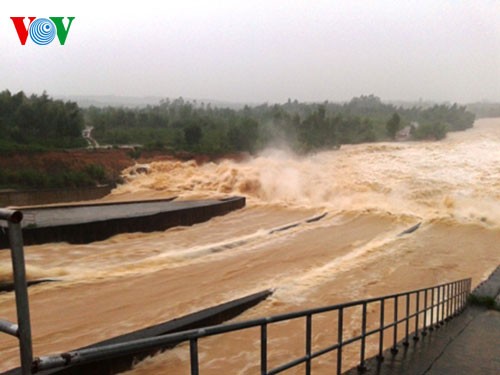(VOVworld) – The UN Conference on Climate Change (COP-20) in Peru announced that 190 countries involved in the United Nations Framework Convention on Climate Change (UNFCCC) will have to adopt national plans to reduce greenhouse gas emissions and submit them to the UN before June, 2015. Vietnam has built its national action program and made a strong commitment to work with the international community to keep global warming below 2 DC.

Quynh Luu district, Nghe An province was flooded by heavy rain and sea level rise after a storm in 2013 |
Vietnam is not a big greenhouse gas emitter, but it is a country seriously affected by climate change, particularly sea level rise. Scientists estimate that at the current global warming rate, sea level rise will submerge 40% of the Mekong river delta, affecting the lives of 35% of the local population by 2050. Vietnam has showed its firm political determination and gotten actively involved in regional and global forums on climate change.
Building a national action program
The 7th session of the 11th Party Central Committee in June, 2013, approved a resolution on responding to climate change and boosting the management of natural resources and the environment. The Prime Minister approved the National Target Program on Climate Change Response until 2050, which consists of three phases and 9 possible tasks to cope with climate change. These are the ultimate legal framework guiding activities to deal with climate change, manage natural resources, and protect the environment.
Climate change-related issues have been widely introduced to the public and social organizations. All provinces and cities have organized tree planting campaigns, low-carbon production initiatives, and green product consumption programs. Truong Duc Tri, Deputy Director General of the Department of Meteorology, Hydrology, and Climate Change, said: “In addition to the government’s efforts, ministries and localities continue to mobilize international resources for climate change response in Vietnam. The business community should also get involved in coping with the impacts of climate change in Vietnam.”
Implementing international commitments
Vietnam was one of the first countries to approve the UN Framework Convention on Climate Change and the Kyoto protocol. Vietnam has participated and has proposed practical initiatives at regional and global forums on climate change. Vietnam plans to reduce its greenhouse gas emissions 8 to 10% and its energy consumption ratio to GDP 1 to 1.5% by 2020 compared to 2010.
At COP-20 in Lima, Peru, Vietnam was one of the first developing countries to submit its biennial report on climate change to the UN Framework Convention Secretariat. Vietnamese Deputy Minister of Natural Resources and Environment Tran Hong Ha said: “Greenhouse gas emissions are increasing more rapidly than in previous decades. It would lead to disasters in 2030 if we fail to keep atmospheric CO2 below 400 parts per million. We need greater advocacy for more effective negotiations.”
Vietnam has insisted on its determination and worked with the international community to build mechanisms for a fruitful negotiation next year on a greenhouse gas emissions reduction agreement to replace the Kyoto protocol.